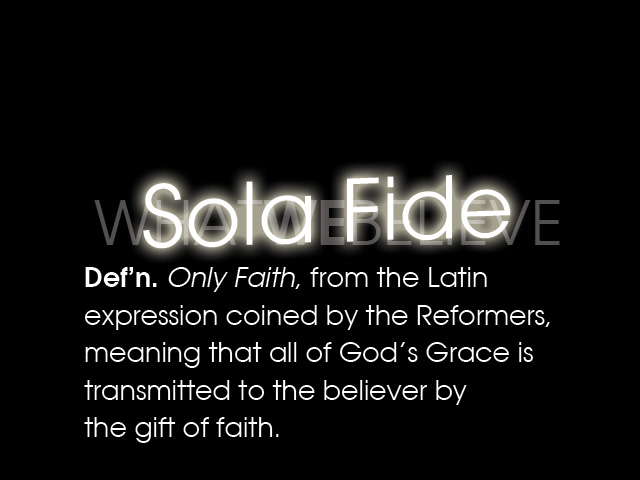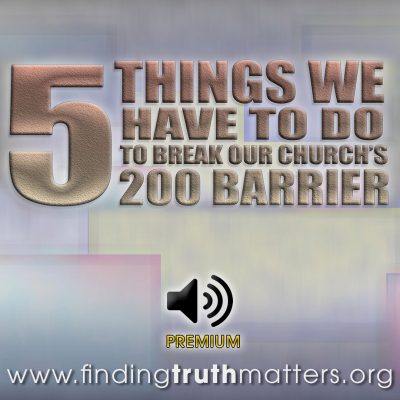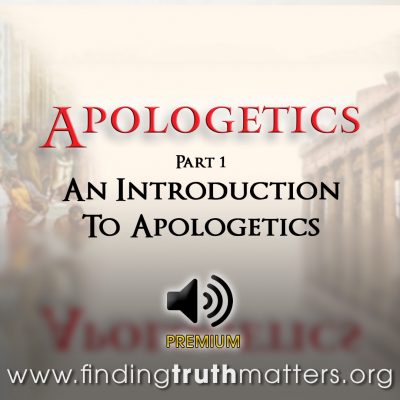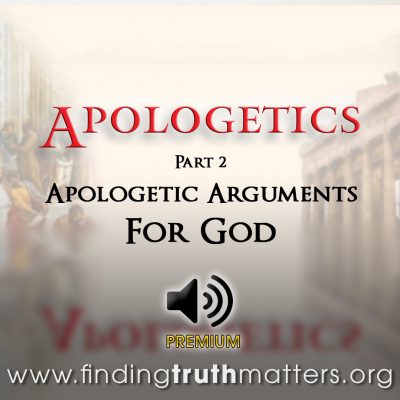home > articles > The 5 Pillars of Biblical Christianity > Sola Fidé
by Dr. Andrew Corbett, pastor of Legana Christian Church, and President of ICI Theological College Australia

Denominations are generally waning in this “post-modern” era. Along with the rise of non-denominationally aligned churches has been a growing doctrinal vacuum as preachers become life-coaches and the emphasis is on making the Bible a “How to…” book. A casual reading of some of these churches doctrinal statements reveals some glaring departures with historic Christianity, which should cause us to wonder how or why they differ so much with the 5 Pillars of Biblical Christianity. Right Doctrine does not guarantee right worship, but faulty doctrine guarantees faulty worship…
PART 4 – SOLA FIDE
 When it comes to the revelation of salvation: Sola Scriptura (the Scriptures alone). When it comes to the identity of the Saviour: Solo Christo (“Christ Alone!”) When it comes to the cause of salvation: Sola Gratia (Grace Alone!). And now – “Faith alone!” Against the backdrop of a State Church, which taught that salvation was earned by a person’s righteous efforts, the Reformers reaffirmed the Biblical position that salvation was received by faith, not works.
When it comes to the revelation of salvation: Sola Scriptura (the Scriptures alone). When it comes to the identity of the Saviour: Solo Christo (“Christ Alone!”) When it comes to the cause of salvation: Sola Gratia (Grace Alone!). And now – “Faith alone!” Against the backdrop of a State Church, which taught that salvation was earned by a person’s righteous efforts, the Reformers reaffirmed the Biblical position that salvation was received by faith, not works.
FAITH & BELIEF
There appears to be two kinds of ‘belief’ in Scripture. There’s the kind of belief that is merely based on facts. That is, a person can believe a fact without that belief necessarily changing who they are. I believe that Nero was Emperor of Rome in A.D. 64 when he launched a 42 month bloody persecution of the Christians. That “belief’ is based on known facts. It appears that this is the kind of belief mentioned in James 2:19 –
You believe that there is one God. You do well. Even the demons believe—and tremble!
James 2:19
But there is clearly another kind of belief which seems to be more akin to trust. This kind of belief is not necessarily just based just on facts. But let us not collapse into the snare of ridicule by thinking that it is some kind of ‘blind faith’ type belief. It is the kind of believing that is based on the gift of God.
Many people claim to ‘believe’ in God, yet they have never received the gift of faith from God. Therefore, simply believing certain facts does not give us the means of being regenerated. After all, James 2:19 says that even demons believe in God! (And they are not regenerated!)
In Old Covenant times the word ‘faith’ rarely (if ever) occurs in the same way that it does in the New Covenant.

FAITH IN THE OLD TESTAMENT
The difference between belief and faith is contrasted starkly in the Old Testament. The two terms seem to have similarities in the New Testament. But in the Old Testament “faith” was what you did because of what you believed. The closest word in English to this Hebrew word for ‘faith’ is faithfulness.
Note and determine what Habakkuk meant by the word “faith” in this verse-.
…But the just shall live by his faith (Bible Translator’s footnote, “faithfulness”).
Habakkuk 2:4b, New King James Version
This verse is cited in the New Testament (Romans 1:17; Galatians 3:11; Hebrews 10:38) but ‘faith’ is now given a different meaning to that of the Old Testament. ‘Faith’ in the New Testament is really about: trust.
The kind of faith that saves is a gift from God. While we distinguish ‘belief’ (agreeing with certain facts) from ‘faith’ (the gift of God) there is a necessary connection between them. For faith to become acceptable the Gospel of Christ first becomes believable.
For Christ is the end of the law for righteousness to everyone who believes.
Romans 10:4 NKJV
Belief (understanding and acknowledging certain facts, in particular the Gospel) therefore precedes faith. This is why the preaching and demonstration of the Gospel is imperative. Christ’s righteousness is imputed on the basis of God’s gift of faith which comes after believing –
But the righteousness based on faith…
Romans 10:6a ESV
 The heart cannot accept as true what the head declares to be false. Removing obstacles to belief and giving reasons to believe does not necessarily save a person. But doing this may be a necessary in order for someone to accept Christ and His saving faith. In August 2006, former investigative journalist and Current Affairs Anchor, Michael Willesee, spoke of how he began to investigate Christianity and became convinced of its truthfulness. If someone had asked him if he was a believer at this time he probably would have said yes, he told interviewer, Andrew Denton. But as Willesee himself said, I still didn’t have the gift of faith. Not until he came to a point of surrendering to Christ, confessing his sin, and putting his trust in Christ (which he claims God enabled him to do) did he experience what he calls conversion and received what he refers to as the gift of faith.
The heart cannot accept as true what the head declares to be false. Removing obstacles to belief and giving reasons to believe does not necessarily save a person. But doing this may be a necessary in order for someone to accept Christ and His saving faith. In August 2006, former investigative journalist and Current Affairs Anchor, Michael Willesee, spoke of how he began to investigate Christianity and became convinced of its truthfulness. If someone had asked him if he was a believer at this time he probably would have said yes, he told interviewer, Andrew Denton. But as Willesee himself said, I still didn’t have the gift of faith. Not until he came to a point of surrendering to Christ, confessing his sin, and putting his trust in Christ (which he claims God enabled him to do) did he experience what he calls conversion and received what he refers to as the gift of faith.

I am crucified with Christ: nevertheless I live; yet not I, but Christ liveth in me: and the life which I now live in the flesh I live by the faith of the Son of God, who loved me, and gave himself for me.
Galatians 2:20
According to Ephesians 2:8-9, faith and grace are both gifts from God. Paul tells the Corinthians that their faith was “a spirit”, which may be understood as a spiritual gift–
And since we have the same spirit of faith, according to what is written, “I believed and therefore I spoke,” we also believe and therefore speak,
Second Corinthians 4:13
When God calls us to Himself by His all conquering grace and gives us the gift of faith to be saved through Christ He also converts us. According to Galatians 5:6, this kind of faith is evidenced by our devotion to the Lord made obvious through our love for Him and others (see also Ephesians 3:17).
It could be argued from Scripture that there are different kinds of faith. The Old Testament seems to talk of faith in terms that we would best understand as “faithful(ness)”. The New Testament seems to describe faith in terms of trust. When Jesus told a person that their faith had made them whole He seems to have been saying that it was the person’s trust put in Christ that pre-empted a miracle (Matt. 9:22). Another kind of faith seems to be in Paul’s mind when he refers to the gift of faith as a spiritual gift available to the the already regenerated believer (1Cor. 12:9). In Romans 12:3 faith appears to be the believer’s understanding of God’s will for their life. And in Romans 1:8 Paul describes “faith” as a commitment to Christ that could be spoken of around the world.
If faith is a gift from God, and its measure is determined by God (Romans 12:1-3), does it grow? Some people have taught that ‘faith’ in the New Testament always refers to the one thing: our ability to believe. In this paradigm of faith, faith that saves us from our sins is “beginner’s” faith or “small” faith, while the faith that can work miracles is “matured” or “great” faith. While some New Testament passages seem to lend support to this view, the weight of the New Testament seems to tip the scales toward there being different ways faith is referred to.
‘Faith’ is referred to as both a verb and a noun in the New Testament. On the one hand it is something we do– we believe. But on the other hand the New Testament also refers to faith as something– the faith. In this latter instance it seems to refer to the entire corpus of Christian doctrine (the framework of our belief). This seems to be how Paul uses it in 1Timothy 6:10. Some have suggested that the New Testament also alludes to the faith as representing the fellowship of believers (the church). When someone wanders from the faith (1Tim. 6:10) they not only turn their back on sound doctrine but the fellowship of believers as well (note Galatians 6:10). Therefore, we need to take great care not to embrace the dodgy doctrine that God will not answer our prayers because we did not have enough faith. Miracles and answers to prayer are the result of God’s grace not our ability to manipulate God with our ability to believe. The kind of faith that Jesus referred to as “great” was the kind of faith that led people to trust God enough to fully obey Him and acknowledge His supremacy in all things (eg. Matt. 15:28).

So now faith, hope, and love abide…
First Corinthians 13:13
Sola Fide!
Amen.
Dr. Andrew Corbett, October 4th 2006
Next, PART 5, Soli Deo Gloria
Previous edition, Part 3 Solo Gratia
Part 1- Sola Scriptura | Part 2- Solo Christo | Part 3- Sola Gratia | Part 4- Sola Fide | Part 5 Soli Deo Gloria | Printable Bible Studies
-
Sale!

5 Things We Need To Do To Break Our Church’s 200 Barrier, Premium Audio
Original price was: $1.75.$0.95Current price is: $0.95. -
Sale!

A Morning With Izaak Walton – The Compleat Man, Premium Audio
Original price was: $1.75.$1.25Current price is: $1.25. -
Sale!

Apologetics Part 1 – Introduction To Apologetics, Premium Audio
Original price was: $1.75.$0.95Current price is: $0.95. -
Sale!

Apologetics Part 2 – The Apologetic Arguments For God, Premium Audio
Original price was: $1.75.$0.95Current price is: $0.95.







































0 Comments